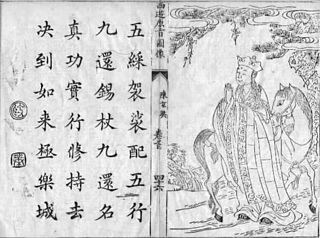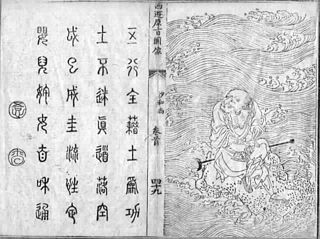Related Research Articles

The Monkey King, also known as Sun Wukong in Mandarin Chinese, is best known as one of the main characters in the 16th-century Chinese novel Journey to the West and many later stories and adaptations. In said novel, Sun Wukong is a monkey born from a stone who acquires supernatural powers through Taoist practices. After rebelling against heaven, he is imprisoned under a mountain by the Buddha. After five hundred years, he accompanies the monk Tang Sanzang (唐三藏) riding on White Dragon Horse and two other disciples, Zhu Bajie and Sha Wujing, on a journey to obtain Buddhist sutras from the West (India), where Buddha and his followers dwell.

Journey to the West (Chinese: 西遊記; pinyin: Xī Yóu Jì; Wade–Giles: Hsi1 Yu2 Chi4) is a Chinese novel published in the 16th century during the Ming dynasty and attributed to Wu Cheng'en. It is regarded as one of the greatest Classic Chinese Novels, and has been described as arguably the most popular literary work in East Asia. Arthur Waley's 1942 abridged translation, Monkey, is known in English-speaking countries.

Tang Sanzang is a Buddhist monk and pilgrim who is a central character in the 16th century novel Journey to the West by Wu Cheng'en. Tang Sanzang is based on the historical Tang Dynasty monk, Xuanzang.

Zhu Bajie (Chinese: 豬八戒; pinyin: Zhū Bājiè; Wade–Giles: Chu1 Pa1-chieh4), also named Zhu Wuneng (he has two Buddhist Dharma names, one, "Wuneng" (悟能) given to him by the bodhisattva, Guanyin, and one, "Bajie" (八戒) given to him by Tang Sanzang/Tripiṭaka), is one of the three helpers of the aforementioned-Tang Sanzang and a major character of the 16th century novel Journey to the West. Zhu means "swine" and Bajie means "eight precepts". Prior to his being recruited by the bodhisattva, Guanyin, Zhu Bajie went by "Zhu Ganglie" (literally "Strong-Maned Pig"). Buddhist scholars consider that both expressions are related to "Śīla pāramitā". In many English versions of the story, Zhu Bajie is called "Monk Pig", "Pig", "Piggy", or "Pigsy".

Sha Wujing is one of the three disciples of the Buddhist pilgrim Tang Sanzang in the 16th century novel Journey to the West written by Wu Cheng'en in the Ming dynasty, although versions of his character predate the Ming novel. In the source novel, his background is the least developed of the pilgrims, and he contributes the least to their efforts.

Journey to the West is a Chinese television series adapted from the classic 16th-century novel of the same title. The series was first broadcast on CCTV in China on 1 October 1986. The series became an instant classic in China and was praised for being one of the most original and faithful interpretations. Unadapted portions of the original story were later covered in the second season, which was released in 1999. CCTV released the entire series online on YouTube and in addition has an edited version with English subtitles, making a total of 40 episodes instead of the original 41.

Monkey: A Folk-Tale of China, more often known as simply Monkey, is an abridged translation published in 1942 by Arthur Waley of the sixteenth-century Chinese novel Journey to the West conventionally attributed to Wu Cheng'en of the Ming dynasty. Waley's remains one of the most-read English-language versions of the novel. The British poet Edith Sitwell characterized Monkey as "a masterpiece of right sound", one that was "absence of shadow, like the clearance and directness of Monkey's mind." The translation won the James Tait Black Memorial Prize in 1942.

Baigujing is a demon from the 16th century novel Journey to the West. The name is translated into English as White Bone Spirit in the William John Francis Jenner translation. Baigujing is a shapeshifting demoness, and in her true form she is depicted as a skeleton.

A Chinese Tall Story is a 2005 Hong Kong fantasy adventure film written and directed by Jeffrey Lau. The story is loosely based on the 16th-century novel Journey to the West.
Gao Village Arc an arc featured within Wu Cheng'en's Journey to the West. This arc takes place generally during chapter 18 – 19 in this novel. Within this article, characters, conflicts, and external phrases shall be elaborated on as to provide a full summary of this arc.

Journey to the West is a Chinese television series adapted from the 16th-century novel of the same title. Production for the 66 episodes long series started on 12 September 2009, and it was first broadcast in mainland China on 28 July 2011 on TVS. The series was produced by Zhang Jizhong and was released a year later than another television series of the same title, but with a different cast and crew.

Journey to the West: Conquering the Demons is a 2013 fantasy comedy film co-written and produced by Stephen Chow and co-directed by Chow and Derek Kwok. The movie was first announced in July 2011 and was released on February 10, 2013 in China. The film is a loose comedic re-interpretation of the 16th-century novel Journey to the West, a Chinese literary classic often believed to be written by Wu Cheng'en.
Wu Cheng'en and Journey to the West is a Chinese television series about the life of Wu Cheng'en and his inspiration for writing the 16th-century novel Journey to the West. The series was directed by Kan Weiping and consists of a total of 45 episodes shot in high definition, each 45 minutes long and containing 10 minutes of 3-D effects. The original lead actors of the 1986 television series Journey to the West starred in Wu Cheng'en and Journey to the West and reprised their roles: Liu Xiao Ling Tong as Sun Wukong, Chi Chongrui as Tang Sanzang and Ma Dehua as Zhu Bajie. Sha Wujing, however, was portrayed by Liu Dagang because the original actor, Yan Huaili, died in April 2009. It was broadcast by Shandong Qilu TV in July 2010.

The White Dragon Horse, known as Bai Long Ma, and Yu Long, in Chinese, is one of the main characters in the 16th-century Chinese novel Journey to the West. He is Tang Sanzang's steed who later became Babu Tianlong Guangli Bodhisattva (八部天龙广力菩萨) at the end of novel.

The Monkey King 2 is a 2016 Hong Kong-Chinese action fantasy film based on the classic 16th-century novel Journey to the West by Wu Cheng'en. The film was shot in 3D and is a sequel to the 2014 box office hit The Monkey King with Cheang Pou-soi returning as director and Sammo Hung as action director, who replaces Donnie Yen's role from the previous installment. The film stars Aaron Kwok, who portrayed the main antagonist in the previous installment, as the film's titular protagonist, who also replaces Yen from the previous installment. It was released in the United States on 5 February, in Hong Kong on 6 February and in China on 8 February 2016. A sequel, The Monkey King 3, was released in China in 2018.

Journey to the West: The Demons Strike Back is a 2017 Chinese fantasy adventure comedy film directed by Tsui Hark. A sequel to Stephen Chow's 2013 film Journey to the West: Conquering the Demons, it was produced and co-written by both Tsui and Chow.

The Monkey King 3 is a 2018 Chinese fantasy film based on the classic novel Journey to the West by Wu Cheng'en. The film is the third installment of the Monkey King franchise, after The Monkey King (2014) and The Monkey King 2 (2016). Directed and produced by Cheang Pou-soi, the film stars Aaron Kwok, Feng Shaofeng, Xiao Shenyang, Him Law and Zhao Liying. The film was released on February 16, 2018, the first day of the Chinese New Year holiday period. It received mixed reviews from critics.

Maori Xingguan is a deity in the traditional Chinese spiritual beliefs. Maori is considered to be one of the 28 Mansions, which are Chinese constellations. These constellations are the same as those studied in Western astrology. Maori Xingguan originated from the ancient Chinese worship of the constellations, a spiritual practice that combines Chinese mythology and astronomy. Maori Xingguan appears in Chinese mythology and literature, notably in the novels Journey to the West and Fengshen Yanyi.
References
- Journey to the West, chapter 18-19 - Wu Cheng-en